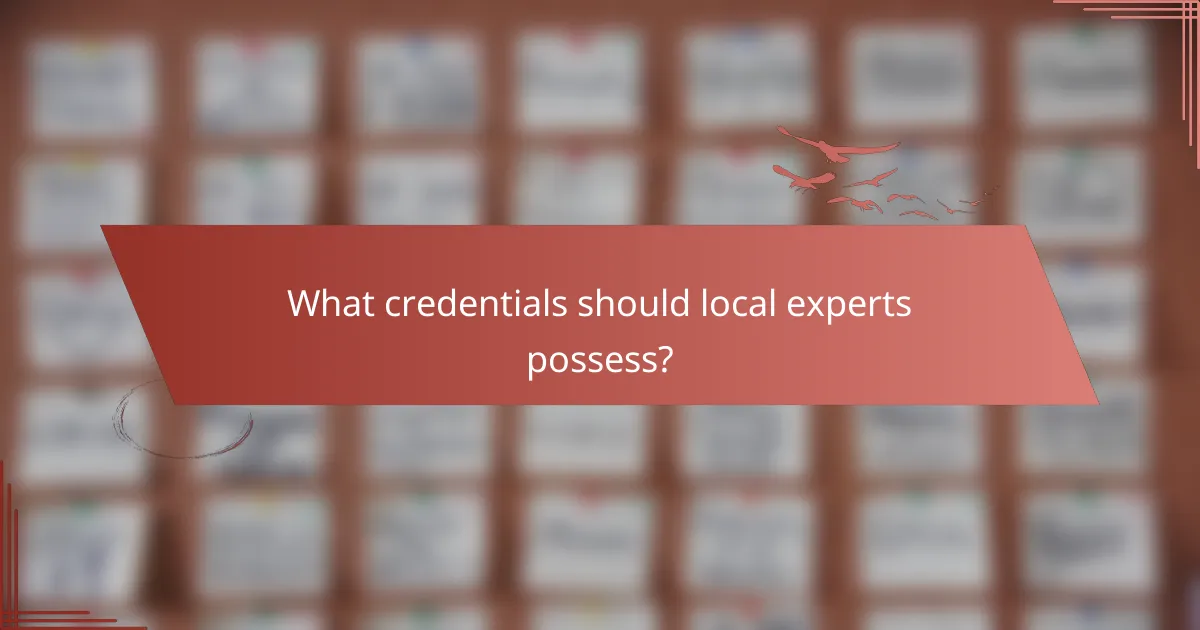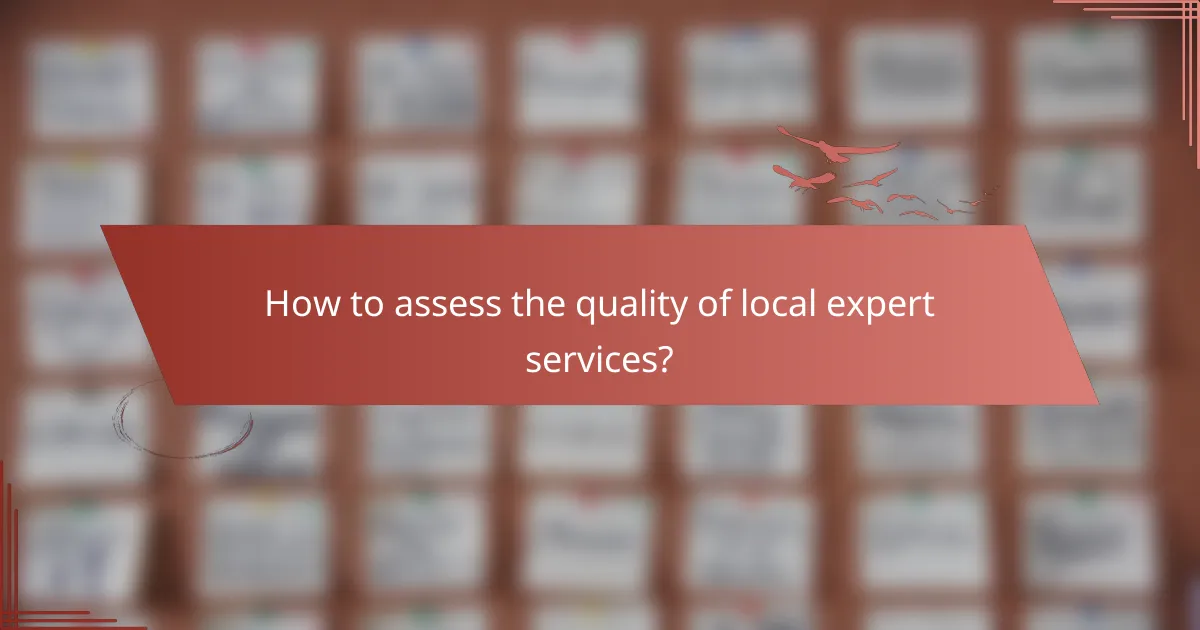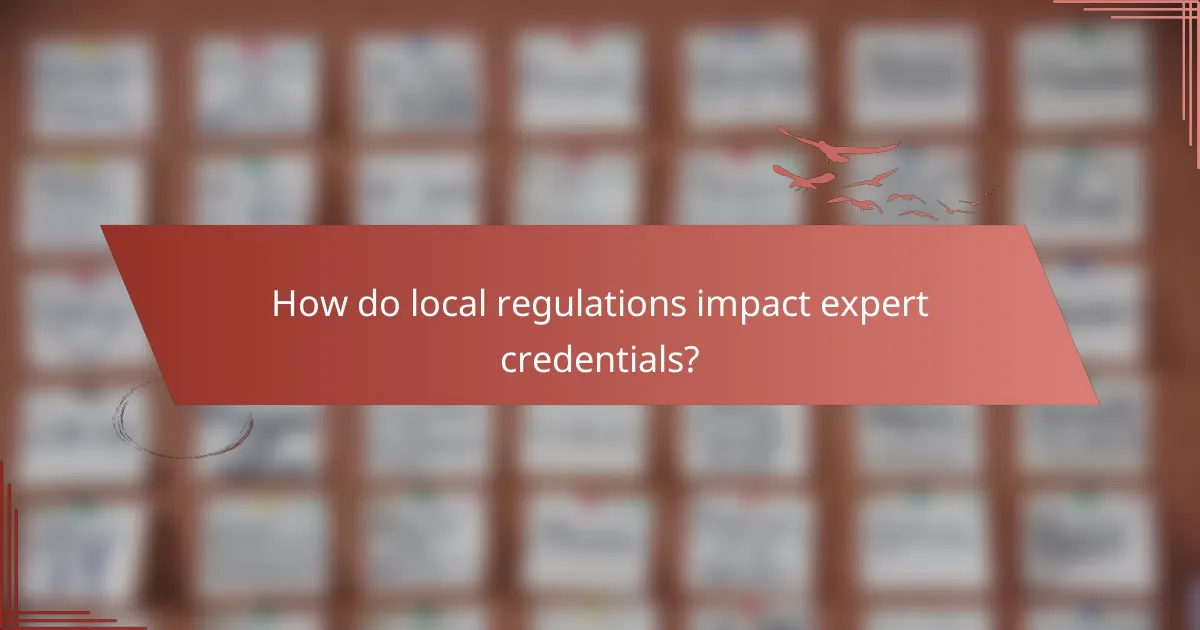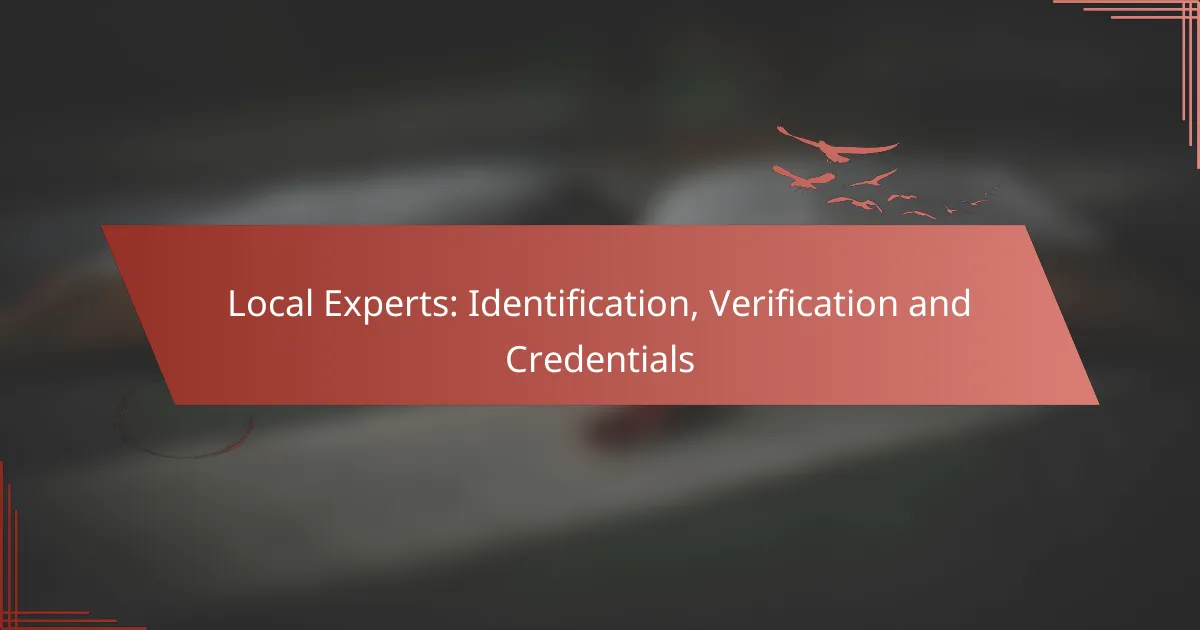Identifying local experts requires thorough research to find professionals with proven knowledge and experience in your community. To ensure their credibility, it’s essential to employ verification methods such as checking certifications and evaluating online reviews, which confirm their qualifications. Additionally, relevant credentials like industry certifications and professional memberships further establish their authority and trustworthiness in their respective fields.

How to identify local experts in your area?
Identifying local experts involves researching professionals who have proven knowledge and experience in a specific field within your community. Utilize various resources to ensure you find credible individuals who meet your needs.
Use online directories like Yelp
Online directories such as Yelp provide user-generated reviews and ratings for local experts across various industries. You can search for specific services and filter results based on ratings, distance, and price range.
When using Yelp, pay attention to the number of reviews and the overall star rating. A higher number of reviews generally indicates reliability, while recent feedback can give insights into current service quality.
Check professional associations
Many professions have associations that maintain directories of certified members. These organizations often require members to meet specific standards and continue their education, ensuring a level of expertise.
For example, if you’re looking for a financial advisor, check if they are a member of the Financial Planning Association. Membership in such organizations can be a strong indicator of professionalism and credibility.
Leverage social media platforms
Social media platforms like LinkedIn and Facebook can be valuable for identifying local experts. On LinkedIn, you can view profiles, endorsements, and recommendations from other professionals.
Additionally, local community groups on Facebook often have discussions where members recommend experts. Engaging in these groups can provide firsthand insights and personal experiences from other community members.
Ask for referrals from local businesses
Local businesses often have established relationships with experts in various fields and can provide trustworthy referrals. When visiting a local shop or service provider, inquire about professionals they recommend.
Consider asking for referrals from businesses that align with your needs. For instance, if you need a contractor, ask a local hardware store for their trusted contacts. This approach can lead you to experts who are well-regarded in the community.

What verification methods ensure expert credibility?
To ensure expert credibility, various verification methods can be employed, including checking certifications, conducting background checks, and evaluating online reviews. These approaches help confirm the qualifications and reliability of local experts.
Review certifications and licenses
Reviewing certifications and licenses is crucial for verifying an expert’s qualifications. Look for industry-specific credentials that demonstrate expertise, such as professional licenses for healthcare providers or certifications for tradespeople. Ensure that these certifications are current and issued by recognized organizations.
For example, a licensed electrician should have a valid state license, while a certified financial planner may display credentials like CFP or CFA. Always check the issuing authority’s reputation to gauge the certification’s legitimacy.
Conduct background checks
Conducting background checks is an effective way to assess an expert’s history and reliability. This process can include criminal record checks, employment history verification, and education confirmation. Utilize reputable background check services to obtain accurate and comprehensive information.
For professionals in sensitive fields, such as healthcare or education, background checks may be mandated by law. Always ensure that the checks comply with local regulations, such as the Fair Credit Reporting Act in the United States, which governs how background checks should be conducted.
Evaluate online reviews and testimonials
Evaluating online reviews and testimonials provides insight into an expert’s performance and client satisfaction. Look for reviews on trusted platforms, such as Google, Yelp, or industry-specific sites. Pay attention to both positive and negative feedback to get a balanced view of the expert’s capabilities.
Consider the volume of reviews as well; a higher number of reviews can indicate a more reliable expert. Additionally, look for patterns in the feedback, such as consistent praise for communication skills or reliability, which can help inform your decision.

What credentials should local experts possess?
Local experts should possess relevant credentials that demonstrate their expertise and reliability in their field. Key credentials include industry certifications, years of experience, and membership in professional organizations, all of which help establish their authority and trustworthiness.
Relevant industry certifications
Industry certifications are formal recognitions that validate an expert’s skills and knowledge in a specific area. These certifications often require passing exams and adhering to ongoing education requirements. For example, a certified financial planner (CFP) must complete a rigorous set of courses and pass a comprehensive exam.
When evaluating local experts, check for certifications that are recognized in your region. In the United States, certifications like Project Management Professional (PMP) or Certified Public Accountant (CPA) are highly regarded, while in Europe, qualifications such as Chartered Financial Analyst (CFA) or Six Sigma certifications may be more relevant.
Years of experience in the field
Years of experience in the field is a crucial indicator of an expert’s practical knowledge and ability to handle various situations. Generally, experts with several years of experience are more adept at navigating challenges and providing effective solutions. A range of 5 to 10 years is often considered a solid benchmark for expertise.
However, the quality of experience matters as much as the quantity. Look for experts who have worked on diverse projects or in various roles within their field, as this breadth of experience can enhance their problem-solving capabilities.
Membership in professional organizations
Membership in professional organizations signifies an expert’s commitment to their field and adherence to industry standards. These organizations often provide resources, networking opportunities, and ongoing education, which can enhance an expert’s skills and knowledge. For instance, being a member of the American Bar Association (ABA) can indicate a lawyer’s dedication to staying current with legal practices.
When assessing local experts, consider their affiliations with reputable organizations. Membership can also provide access to a network of peers, which can be beneficial for collaboration and staying informed about industry trends.

How to assess the quality of local expert services?
To assess the quality of local expert services, focus on their experience, credentials, and client feedback. Evaluating these aspects can help ensure you choose a reliable professional who meets your specific needs.
Request case studies or portfolios
Asking for case studies or portfolios allows you to see the expert’s past work and results. Look for examples relevant to your project or industry, as this demonstrates their capability and understanding of your requirements.
When reviewing portfolios, pay attention to the diversity of projects and the complexity of challenges tackled. A well-rounded portfolio can indicate a versatile expert who can adapt to various situations.
Compare service offerings and pricing
Comparing service offerings and pricing is crucial to ensure you receive value for your investment. Create a list of potential experts and outline their services, pricing structures, and any additional fees to facilitate a straightforward comparison.
Consider the range of services provided, from basic consultations to comprehensive packages. Pricing can vary significantly, so look for options that fit your budget while still meeting your quality standards. Aim for a balance between cost and the expertise offered, as the cheapest option may not always deliver the best results.

What are the best practices for hiring local experts?
To hire local experts effectively, focus on their qualifications, experience, and reputation within the community. Utilize a structured approach that includes interviews, reference checks, and feedback from previous clients to ensure you make an informed decision.
Conduct interviews to gauge expertise
Interviews are a crucial step in assessing a local expert’s knowledge and skills. Prepare a set of targeted questions that relate to their specific field and experience, allowing you to evaluate their problem-solving abilities and practical insights.
Consider incorporating scenario-based questions that reflect real challenges they might face in your project. This approach not only reveals their expertise but also their thought process and adaptability.
Check references and past client feedback
Verifying references and gathering feedback from past clients is essential for understanding an expert’s reliability and performance. Request a list of previous clients and reach out to them to inquire about their experiences, focusing on the expert’s communication, timeliness, and quality of work.
Online reviews and testimonials can also provide valuable insights. Look for consistent patterns in feedback, such as high satisfaction rates or recurring issues, to help you gauge the expert’s overall reputation in the local market.

How do local regulations impact expert credentials?
Local regulations significantly influence the credentials required for experts in various fields. These regulations can dictate the necessary qualifications, certifications, and ongoing compliance standards that professionals must meet to practice legally and effectively.
Understanding Local Regulations
Local regulations vary widely by region and profession, affecting how experts are credentialed. For example, in the healthcare sector, regulations may require specific licenses for practitioners, while in construction, building codes may necessitate certifications for safety compliance. Understanding these local requirements is crucial for anyone seeking to establish themselves as an expert.
Verification Processes
Verification processes for expert credentials often involve multiple steps, including background checks, education verification, and professional experience assessments. Many regions require experts to submit documentation to a governing body or licensing board, which reviews qualifications against established standards. This ensures that only qualified individuals are recognized as experts in their fields.
Common Credentials and Certifications
Credentials and certifications can vary greatly depending on the industry and location. For instance, in the United States, professionals may seek certifications from recognized organizations such as the American Board of Medical Specialties for healthcare or the National Institute for Certification in Engineering Technologies for engineering. Understanding which credentials are valued in your local area can enhance your professional standing.
Challenges in Credentialing
One of the main challenges in credentialing is navigating the complexity of local regulations, which can change frequently. Experts may find it difficult to keep up with new requirements or variations in standards across different jurisdictions. It’s essential to stay informed about local laws and seek guidance from professional associations or regulatory bodies to avoid pitfalls.
Tips for Compliance
- Research local regulations thoroughly before pursuing credentials.
- Maintain accurate records of your qualifications and continuing education.
- Engage with professional networks to stay updated on regulatory changes.
- Consult with legal or compliance experts if unsure about requirements.
